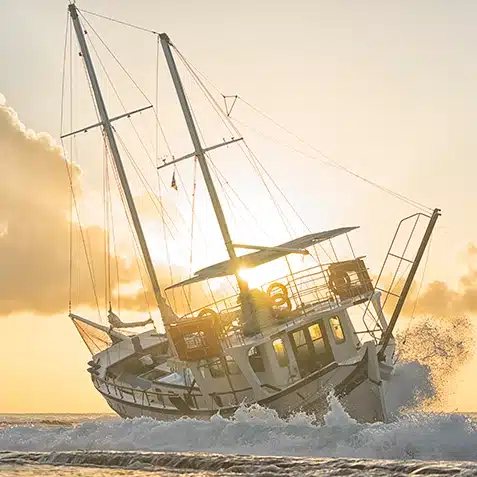Marine Incidents
Short Course in Marine Incident Investigation Course
About Marine Incident Investigation
This specialist course will provide you with the crucial knowledge required when working in a marine incident investigation role.
This course is perfect for personnel who are responsible for accident prevention, such as ship safety officers, company safety officers, Designated Persons Ashore (DPAs), Captains and senior ship officers, operational ship managers, engineering and/or marine superintendents. It also applies to safety professionals, incident investigators, marine surveyors, loss prevention managers, risk managers, P&I underwriters and claims managers, solicitors, accountants, Flag and PSC inspectors and classification society surveyors.
On successful completion, students will receive a Certificate in Marine Incident Investigation.


Duration:
6 months

Modules:
1 in total

Cost:
£295

Assessment:
20 Multiple Choice Questions
Need more information about our Short Course in Marine Incident Investigation?
Marine Incident Investigation Short Course includes:
Flexible Study Duration: Enjoy 6 months of online access, allowing you to study at your own pace, from anywhere in the world.
Learning Format: 100% online, with access to our student learning portal.
Assessment: Complete a 20 multiple choice online assessment when you have completed your studies.
Certification: Upon successful completion students receive a digital PDF certificate. A printed certificate completion pack is also available upon request.
Digital Course Badge: Upon successful completion students will receive an exclusive course badge for use on business cards, LinkedIn profiles and website(s)!
Short Course - £295
Ideal for anyone looking to get an introduction to the industry.
✔
✔
✔
✔
✔
Marine Incident Investigation Curriculum: One Module
The online course consists of 1 module that must be completed within 6 months. The module consists of text, tables and pictures to assist in your learning. Following the completion of the course content, students must pass 20 multiple-choice questions with a score of 70% or higher.
The Background to Marine Incident Investigation
- Introduction
- Incidents and Investigation
- Defining a Casualty
- Types of Investigation
- Appointing an Incident Investigator
- Scope of the Investigation
The Human Factor in Incident Investigations
- Introduction
- The Man-Machine Interface
- Human Capabilities
- Equipment Design and Functionality
- The Physical Environment
- The Management Environment
Initial Actions in an Investigation
- The Investigation Site
- Initial Assessment of the Available Evidence
- Meeting with Interested Parties
Managing the Investigation
- Preservation of Evidence
- The Different Types of Witnesses
- Managing the Analysis
- Format of the Report
- Managing Report Writing
- Release of Information to Interested Parties
Witnesses and Interviews
- Collecting Data
- Collecting Human Evidence
- Preparing for Interviews
- Individual versus Group Interviews
- Some Key Rules for Interviewing
- Evaluating the State of Mind of a Witness
Collecting Physical Evidence
- Documenting Physical Evidence
- Sketching and Mapping
- Photographing and Video Recording Physical Evidence
- Inspecting Physical Evidence
- Removing Physical Evidence
- Collecting Documentary Evidence
- Preserving and Controlling Evidence
Human Factors
- Objectives of the Human Factors Investigation
- Scope of the Human Factors Investigation
- Gathering Human Factors Information
- Sources of Human Factors Information
- Data Collection Using the SHEL Model
- Data Gathering Guidelines
- The Liveware (Central Component)
- Liveware Psychosocial Factors
- The SHEL Interfaces
- Liveware-Hardware Factors
- Liveware-Liveware Factors
- Liveware-Software Factors
- Liveware-Environment Factors
Analyses, Tools & Techniques
- Conducting Analyses
- Determining Facts
- Using the Core Analytical Techniques
- Events and Causal Factors Charting and Analysis
- Barrier Analysis
- Change Analysis
- Determining Causal Factors
- Root Cause Analysis
- Tier Diagram
Developing Conclusions & Making Recommendations
- Conclusions
- Recommendations
Witness Interviewing
- How to Obtain that Extra Measure of Information
- Introduction
- Social Skill
- Language, Speech and Paralanguage
- The Face
- Gesture
- Touch
- Proxemics
- Orientation
- Social Skills and Investigation
- Memory
- Short-Term Memory (STM)
- Transfer to Long-Term Memory (LTM) – Encoding
- Memory for Complex Events
- Questioning
- Appropriate Types of Questions
The Cognitive Interview
- What is the Cognitive Interview?
- Report Everything
- The Mental Reinstatement of Context
- Recall in a Variety of Temporal Orders
- Change Perspectives Technique
- Memory ‘jogs’
- Does the CI Work?
- Conclusion
Appendix 1: List of Potential Sources of Evidence
- Plans, Diagrams and Lists
- Statutory and Other Certificates
- Charts, Log Books and Other Records
- Operating Procedures and Manuals
- Miscellaneous
Appendix 2: References & Further Reading
- References
- Further Reading
Hear from our Students
Meet the Course Author
Ian Biles
Master Mariner, BEng (Hons), MA, CEng, CMarEng, DipMarSur, RYA Yachtmaster (Ocean), Eur Ing, FNI, MRINA, MIMarEST, MRIN, MSNAME, MIIMS, MSCMS, MHCMM, AMS (SAMS), MEWI
Ian started sailing with his father at the age of 12 and went to sea upon finishing school. He sailed worldwide for 13 years on a range of commercial ships spending his leave sailing yachts around the United Kingdom and in the Mediterranean. Throughout this time, Ian studied for various qualifications passing his Royal Yacht Association Ocean Yachtmaster Certificate in 1982 and Class 1 Master Mariner Certificate in 1984.
In 1988, Ian was recruited by Shell International Marine who sponsored him to return to university and study for an Honours degree in Naval Architecture. He went on to take a masters degree in Business Management.
Ian began his own marine surveying and consultancy business in 1992 at which time he became involved with the International Institute of Marine Surveyors and was subsequently elected as President for a three-year term in 1999.
Ian is possibly one of the most qualified marine surveyors in the business.

Why Choose The Maritime Training Academy?

Flexible
Online learning allows you to study in your own time, at your own pace from anywhere in the world. This saves on travel and classroom costs and allows you to fit your studies around your job and progress your career.

Supportive
While the nature of distance learning is independent study, we recognise the importance of support. Students can contact us at any time during their course for assistance and our team of industry experts are always on hand for advice.

Expertise
We have over 50 industry experts writing, developing and advising on our course material. We truly believe that allowing students to tap into their expertise and knowledge is of the utmost importance to fulfil your dream career.
If you would prefer to complete this as a classroom-based course, please contact us.
